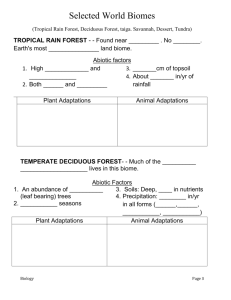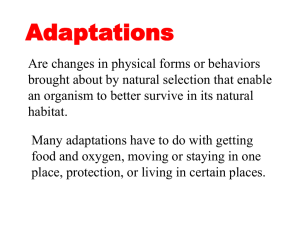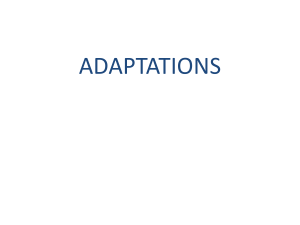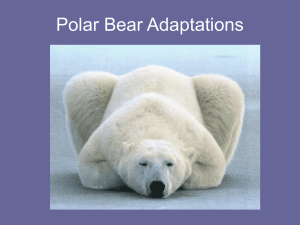Temperate Deciduous Forest
advertisement
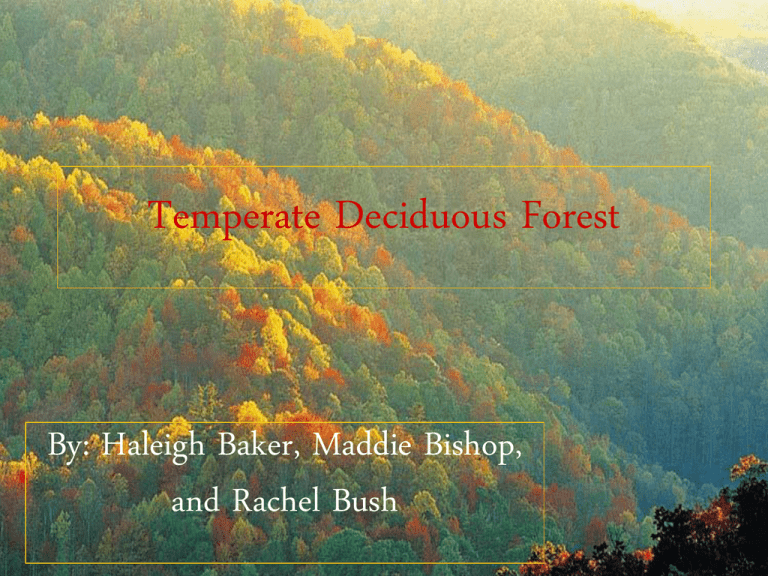
Temperate Deciduous Forest By: Haleigh Baker, Maddie Bishop, and Rachel Bush General Climate • Weather systems usually travel from West to East, with the wind. • Western Coasts receive winds/ weather that has crossed the ocean and Eastern Coasts receive winds/ weather that has crossed over land. • Each month you can expect typical average temperatures and certain types if weather, temperature and humidity can change in a day, hour, or even a few minutes, though. Each day is hard to predict. General Climate (cont.) • 60-80% relative humidity helps to moderate temperature change from day to night • Precipitation is distributed fairly evenly throughout the year, there are no rainy or dry seasons. • There are four seasons: -Spring (moderately cool to warm), summer(Typically hotter temperatures), fall(moderately warm to cool), and winter(Cold season). Common Characteristics • -Latitude ranges between 23 degrees North and 38 degrees South. • This biome occupies the eastern half of the United States and a large portion of Europe. It is characterized by: -hardwood trees (e.g., beech, maple, oak, hickory) are deciduous; that is, shed their leaves in the autumn. Common Characteristics(cont.) -The number of different species is far more limited than in the jungle. -Large stands dominated by a single species are common. -Deer, raccoons, and salamanders are characteristic inhabitants. -During the growing season, this biome can be quite productive in both natural and agricultural ecosystems. Adaptations • Adaptation to fire – Opportunist species, which are quick to colonize open or disturbed ground, are killed by fire, but their seeds are not. These species produce seeds in prodigious amounts. The seeds disperse widely and germinate rapidly. It is a strategy that allows species to occupy sites cleared by fire in the northern and western United States and to mature and produce seed before conifers grow taller and shade them. Adaptations(cont.) • Seasonal Adaptations – These animals have unique adaptations suited for seasonal life. For example, some rodents and mammals store up fat, and then hibernate during cold winters. Some birds also migrate south for the winter so they can continue to live in a warm environment. Common Animals • Mammals – Brown Bears: Ursus arctos – Wild Boar: Sus scrofa – North American Beaver: Castar Canadensis • Birds – Yellow Warbler: Dendroica petechias – Magnolia Warbler: Dendroica magnolia – Brown Thrasher: Toxostoma rufum Animals(cont.) • Amphibian – Longtail salamander: Eurycea longicaudata – American Toad: Bufo americanus • Reptiles – Black Rat Snake: Elaphe obsoleta • Insects – Sassafras Borer: Oberea ruficollis Common Plants • • • • • • White Oak: Quercus alba American Beech: Fagus grandifolia Myrtle Beech: Nothofagus cunning hamii Bald Cypress: Taxodium ascendens Scarlet Pimpernel: Anagallis arvensis Marsh Marigold: Caltha palustris • Bibliography • • • • Allaby, M. (2006). Temperate Forests. Chelsea House Publishers. Print. Photograph. Web. <http://fig.cox.miami.edu/Faculty/Dana/50-16f-TempForest.jpg>. Photograph. Web. <http://www.vtaide.com/png/foodweb/deciduous-sm.jpg>. Photograph. Web. <http://www.world-builders.org/lessons/less/biomes/deciduous/decfor/decchain.gif>. • Photograph. Web. <http://www.stephsnature.com/images/Websitelifescience/ecology/foodweb.gif>. • Web. <http://www.stephsnature.com/images/Websitelifescience/ecology/foodweb.gif>.


